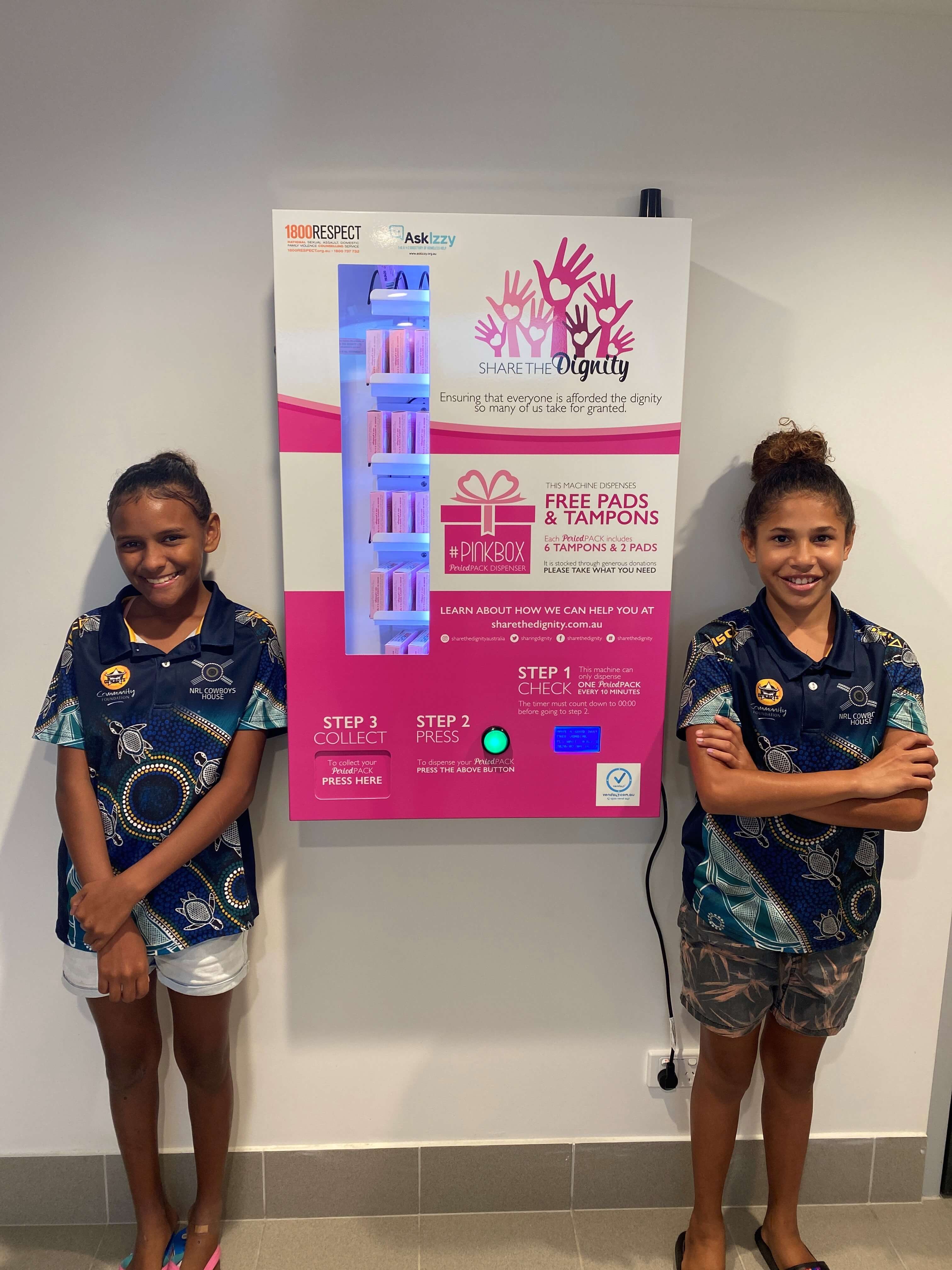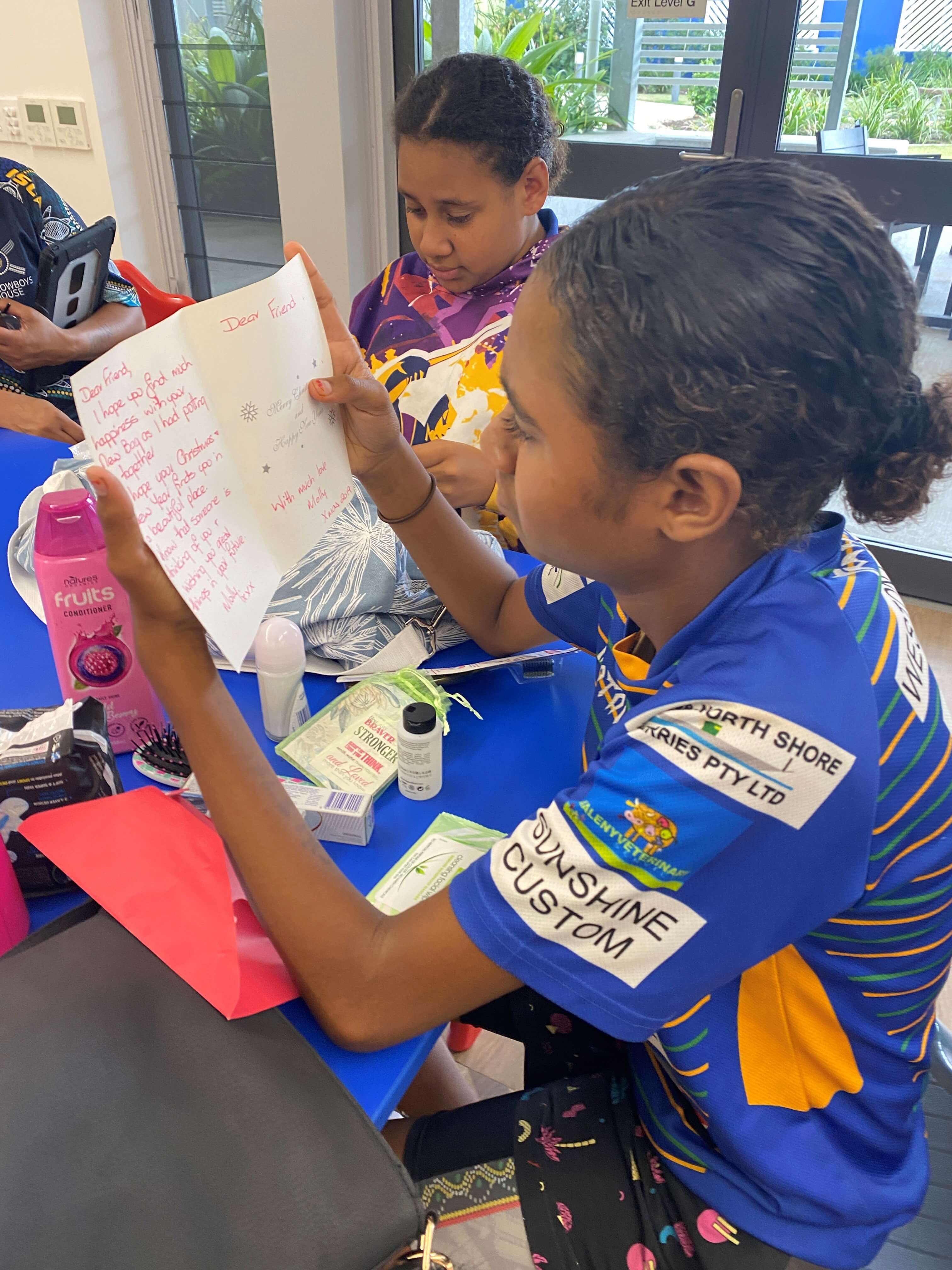Indigenous Menstrual Health
Acknowledgement of Country
Share the Dignity acknowledges the Traditional Custodians of the lands and waters throughout Australia.
We pay our respects to Elders - past, present and emerging and extend that respect to all Aboriginal and Torres Strait Islander peoples.
We would like to acknowledge our Aboriginal and Torres Strait Islander staff and volunteers, and thank our charity partners and the communities who have welcomed Share the Dignity to their land.
Through our Reconciliation Action Plan, we continue our journey and commitment to learn and do more.
Aboriginal and Torres Strait Islander people should be aware that this website may contain images, voices or names of deceased persons in photographs, film, audio recordings or printed material.

Our Business is Women's Business
We believe every woman everywhere should have access to period products. Our Indigenous Menstrual Health (IMH) program seeks to address any disadvantages and barriers to menstrual health and hygiene equity that Aboriginal and Torres Strait Islander menstruators may experience.
Share the Dignity is committed to ensuring that Aboriginal and Torres Strait Islander peoples have access to period products to menstruate with dignity. We know that menstruation is considered private women’s business in Aboriginal and Torres Strait Islander culture, and we want to listen and learn to help address any barriers to menstrual health equity in a culturally sensitive and appropriate manner.
One of the challenging factors is that many remote Aboriginal and Torres Strait Islander communities have limited access to clean water, working toilets, and affordable period products. We've worked with a team of researchers to assess these barriers and understand how Share the Dignity can assist in empowering communities with the tools and education they need to ensure equitable menstrual health and hygiene (MHH).
In many remote communities across Australia, the cost of period products is exorbitant ($10+ per packet) due to greater freight costs and limited availability in these areas. We’ve heard firsthand how people have had to make do because they simply could not afford to purchase period products. To help alleviate this ongoing cost, one part of our IMH program sees that we distribute thousands of packets of period products to remote communities across the country to ensure that they are empowered to take control of their period.
Through the IMH initiative, we also offer wider support by supplying It's in the Bag donations filled with essential items and toiletries to remote Indigenous communities. Providing a range of period products affords choice to those in need and a bag allows people accessing donations to be more discreet when taking advantage of the additional period products.
The feedback we receive about the value these items bring to a community is that they don’t just help someone manage their period; they are used in combination with other initiatives and programs already shaping women’s health in Indigenous communities, and provide an opportunity for conversations, check-ins, and education about important health topics within the community.
We also have a network of our Dignity Vending Machines installed across Australia, including in Aboriginal and Torres Strait Islander community centres, to give people access to free period products.
We are committed to installing a number of our Dignity Vending Machines into Aboriginal and Torres Strait Island community centres to give Indigenous Australians access to free period products if they are in need.
Menstrual Health and Hygiene
Menstrual Health and Hygiene (MHH) is about ensuring that menstruators can manage their period in a hygienic and dignified way. Part of this is ensuring access to ‘WASH’ facilities, meaning safe and clean water, sanitation (e.g. toilets), good hygiene (such as the ability to clean hands/body), and waste disposal. This is then paired with access to clean material to absorb or collect menstrual blood, such as single use or reusable products.
Critical to ensuring MHH is also discreet and private access to change materials as frequently as required, washing facilities, and the ability to discretely dispose of used materials. Menstrual hygiene products include pads, tampons, and re-usable items (such as menstrual cups, period underwear, and reusable pads).
In March 2018, Share the Dignity participated in a women’s yarning circle about MHH. Women attending included researchers from the University of Queensland, Central Queensland University, Johns Hopkins University, Leeds University, members of the National Aboriginal and Torres Strait Islander Women’s Alliance (NATSIWA), and Women on Country.


5 Key Actions for Indigenous Menstrual Health and Hygiene
Menstrual health and hygiene can be a challenge for many Indigenous women, not only in remote communities, but also in urban settings, with multiple systematic and cultural barriers that hinder the path to better outcomes.
The yarning circle identified options to reduce and remove these barriers and Share the Dignity have made it our priority to play our part. To support Indigenous Menstrual Health, there were five key actions identified, including:
- Access to period products
- Culturally tailored education
- Promote pride for female bodies
- Advocate for policy action
- Improved access to Water, Sanitation and Hygiene (WASH)
The Australian Institute for Aboriginal and Torres Strait Islander Studies reinforces that communities vary in terms of priorities. To address Indigenous MHH throughout Australia, it is important to acknowledge that every individual community is different. Each has their own culture and way of sharing knowledge.
It is important that relationships are established with each individual community from the outset to understand the local barriers and contexts. To meaningfully engage in this space, Share the Dignity committed to the following ways of working with our Indigenous communities:
- Embrace self-determination among Indigenous Australians
- Acknowledge Indigenous Australian culture and beliefs
- Speak a language to a strengths-based approach
- Continue to build rapport and relationships with communities
- Continue to be invited to community, progress slowly, and maintain trust
- Continue to be a critically reflective partner
- Embrace self-determination among Indigenous Australians
This is not a simple task. Many communities with high proportions of Indigenous women aged 10 – 55 years also:
- experience high rates of homelessness
- are located in remote and very remote locations
- have low socioeconomic status
- face food insecurity


Women living in these regions have less access to MHH products, as they may have to travel greater distances to stores, and because it is more expensive to deliver goods to regional areas, which can mean deliveries are less frequent. It has been reported that remoteness can increase the cost of menstrual hygiene products as much as 100%. In addition, they have limited access to pain relief, and either no access or extremely limited access to waste-free reusable products to help limit recurring monthly costs.
The Bigger Picture
Aboriginal and Torres Strait Islander women and girls who live in rural and remote communities are less likely to have access to affordable menstruation products. This can result in the use of unhygienic alternatives and skipping school to avoid embarrassment. The provision of menstrual products is imperative for women living in lower socioeconomic areas.
To improve MHH overall, programs are needed to address the bigger social and economic picture, including the links to:
- housing infrastructure (access to water, flushing toilets)
- overcrowding (privacy)
- healthy living practices (appropriate hygiene education and resources).

Effective relationships with Aboriginal and Torres Strait Islander communities develop from a shared understanding of an issue, and the identification of common goals through local engagement. To do this, Indigenous organisations are often the most visible key points of ‘engagement’ with communities, and this is also the preferred method of communication for Aboriginal and Torres Strait islander peoples with outside organisations.
Planning with the community at a grass-roots level and working strategies from the ground up provides a level of autonomy for local groups to agree on priorities and hold a voice in their own community development.

Libra (Essity Australia) proudly support our Indigenous Menstrual Health (IMH) program by donating hundreds of thousands of period care products to Share the Dignity. We divert the product via our IMH program and distribute them far and wide across Australia via our network of more than 3,000 charity partners. We specifically provide these products to charity partners who support remote Indigenous communities, helping to get period products where they are needed. This has meant that instead of paying exorbitant costs for packet of period products, we have been able to provide an abundance of period products at no cost to Indigenous communities.
Since the commencement of our partnership with Libra more than 300,000 packets of period products have been distributed. We are so grateful for their ongoing support and proud to be able to partner with an organisation that supports Australians both making the product locally and distributing to those in need.
To register your charity please visit: https://www.sharethedignity.org.au/end-period-poverty/our-charity-partners/register-your-charity
For any queries or support please reach out to our Indigenous Menstrual Health Coordinator at imh@sharethedignity.org.au.




